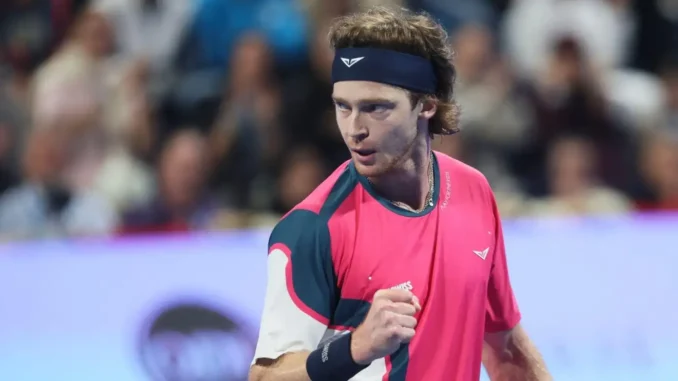
Andrey Rublev, the fiery Russian tennis star ranked ninth in the world, has sent shockwaves through the ATP Tour with a bold move to shake up his coaching team. After a rocky start to the 2025 season that saw his form falter, the 27-year-old has enlisted the expertise of a two-time Grand Slam champion, a compatriot with a storied past and a reputation for both brilliance and unpredictability. This strategic addition comes as Rublev gears up for the clay-court season, a surface where he’s tasted success before, and it signals his determination to reclaim his spot among the sport’s elite.
Rublev’s year has been a tale of highs and lows. The highlight came early in February when he stormed to the Qatar Open title in Doha, outlasting Britain’s Jack Draper in a thrilling three-set final to claim his 17th career singles trophy. That victory, where he averaged an impressive 98.8 points over five matches, hinted at a resurgence for a player who once reached a career-high No. 5 ranking in 2021. But the momentum quickly faded. Losses piled up—first to Quentin Halys in Dubai, then to Matteo Arnaldi at Indian Wells, and most recently to Zizou Bergs in a shocking Miami Open opener. That defeat in Florida stretched his losing streak to three, leaving his season record at a middling 9-7. For a player known for his relentless baseline aggression and thunderous forehand, the inconsistency has been a bitter pill to swallow.
Enter the new coach: a Russian legend who captured the 2000 US Open and 2005 Australian Open titles, a former world No. 1 whose career was as electrifying as it was tumultuous. This isn’t just any hire—it’s a reunion of sorts. Rublev has long admired this figure, once admitting that their conversations pulled him through some of his darkest moments. “I was completely lost,” he’d said earlier this year, reflecting on a time when mental health struggles and even antidepressants clouded his path. “I was thinking, what’s the purpose of living?” Those candid words laid bare a vulnerability that’s endeared him to fans, and it was this same mentor who helped him ditch the medication and rediscover his spark. Now, that bond is evolving into a formal partnership, with their first test slated for the Monte Carlo Masters on April 7.
The clay season holds special promise for Rublev. He’s no stranger to success on the red dirt, having clinched the Monte Carlo title in 2023 with a dramatic comeback against Holger Rune. That victory, a 5-7, 6-2, 7-5 thriller, marked his first Masters 1000 crown and showcased his grit—a quality he’ll need in spades to reverse his current slide. Two years prior, he’d reached the final there, only to fall to Stefanos Tsitsipas in straight sets. With his new coach’s clay-court pedigree—including a semi-final run at the 2002 French Open and finals in Hamburg against Gustavo Kuerten and Roger Federer—Rublev is banking on a wealth of experience to sharpen his game. “Hopefully, we can do some damage together,” he’s reportedly mused, a glint of optimism cutting through his recent frustration.
This isn’t a complete overhaul, though. Fernando Vicente, the Spaniard who’s guided Rublev since 2017, remains the cornerstone of his team. Vicente, a former top-30 player himself, has been instrumental in molding Rublev into a consistent top-10 threat, steering him to 12 of his 17 singles titles and earning ATP Coach of the Year honors in 2020. The new addition joins rather than replaces him, forming a dynamic duo that blends Vicente’s steady hand with the Grand Slam winner’s fiery insight. It’s a calculated gamble—pairing a long-term strategist with a proven champion who once thrived under pressure, even if his own career was peppered with tales of late-night revelry and on-court unpredictability.
Rublev’s struggles this year aren’t just about losses. His emotional volatility, a double-edged sword that fuels his intensity but sometimes unravels his focus, has been a recurring theme. The Miami defeat to Bergs, a player ranked outside the top 100, stung deeply, and Rublev didn’t hide his disappointment. “It’s tough to keep going when things aren’t clicking,” he’s hinted in the past, a sentiment that likely lingered as he packed up in Florida. Yet, this coaching shakeup suggests he’s not content to wallow. The clay swing—Monte Carlo, Barcelona, Madrid, and beyond—offers a fresh canvas, and with a mentor who’s navigated the highs and lows of the sport, Rublev is poised to channel his passion into results.
As the tennis world turns its eyes to Monte Carlo, the spotlight will be on this revamped team. Can the Russian legend’s fiery spirit ignite Rublev’s game? Will their shared history translate into on-court chemistry? For a player who’s reached 10 Grand Slam quarter-finals without breaking through, the stakes feel higher than ever. With his new coach in tow, Rublev isn’t just chasing wins—he’s hunting a legacy, one clay-court battle at a time.
Leave a Reply